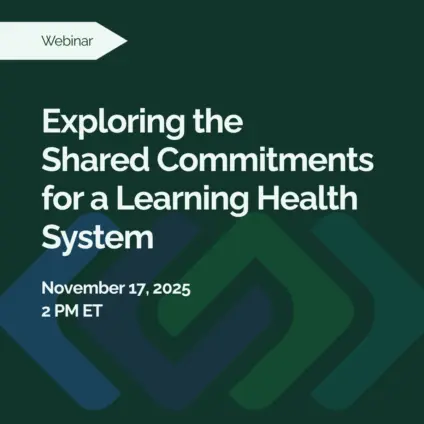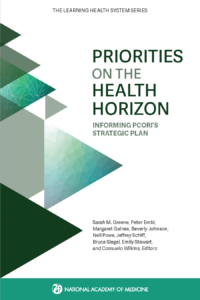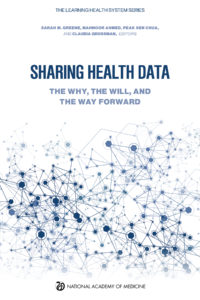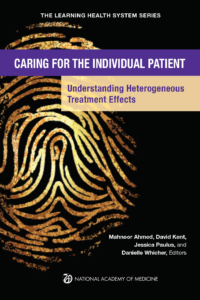Learning Health System Shared Commitments

A Learning
Health System is...
“one in which science, informatics, incentives, and culture are aligned for continuous improvement, innovation, and equity—with best practices and discovery seamlessly embedded in the delivery process, individuals and families active participants in all elements, and new knowledge generated as an integral by-product of the delivery experience.”
Imagine that every time you see a doctor, visit the hospital, or speak with your insurance company, those interactions help improve not only the U.S. health systems’ overall performance but, most importantly, your health outcomes. That vision for a Learning Health System (LHS) is within reach, and with technologies like artificial intelligence and increasing demand for modern and affordable health care, it is closer than ever. By collaborating and aligning the stakeholders across the health ecosystem—from doctors and device manufacturers to insurers and policymakers to patients and families—the health ecosystem can fulfill expectations for continuous sustained improvements for all.
Extraordinary advances in digital health capacity, new research approaches, and a growing appreciation for the need to more rapidly adopt lessons learned about effective interventions offer the nation both an opportunity and pressing imperative to implement the Shared Commitments of the LHS as a means of providing common ground for systematic, sustained, and focused improvements.
Shared Commitments: A Trust Framework
Health and health care that is…
ENGAGED | Gives primacy to understanding, caring, and acting on people’s goals |
SAFE | Deploys verified protocols to safeguard against risk from unintended harm |
EFFECTIVE | Applies continuously updated evidence to target goal achievement |
EQUITABLE | Advances parity in individual opportunity to reach full health potential |
EFFICIENT | Delivers optimal outcomes and affordability for accessible resources |
ACCESSIBLE | Provides timely, convenient, interoperable, and affordable services |
ACCOUNTABLE | Identifies clear responsibilities, measures that matter, and reliable feedback |
TRANSPARENT | Displays full clarity and sharing in activities, processes, results, and reports |
SECURE | Embeds safeguards in access, sharing and use of data and digital/AI tools |
ADAPTIVE | Centers continuous learning and improvement in organizational practices |

A Trust Framework for the Common Good
Shared Commitments Initiative
The National Academy of Medicine seeks to accelerate transformation of health and health care outcomes to improve quality, safety, patient-centeredness, and affordability through the LHS Shared Commitments Initiative.
The Shared Commitments Initiative is a multi-phased, multi-year project to facilitate widespread adoption of the pillars, operational features, and Shared Commitments of an LHS by engaging with a broad range of health sectors, disciplines, and stakeholders in a collaborative movement. The Shared Commitments were developed using nearly two decades of consensus reports—including To Err is Human, Crossing the Quality Chasm, and Best Care at Lower Cost—workshops, and committees, and offer a trust framework for health and health care, representing the expectations and commitments for health systems on behalf of all health stewards. Implementation is guided by a Strategy Group comprising individuals from leading organizations from across the health ecosystem.
Webinar
Exploring the Shared Commitments for a Learning Health System
On November 17, 2025 the NAM held a webinar exploring the Shared Commitments for a Learning Health System as a common ground framework for collective action to improve health and health care.

Strategy Group Co-Chairs


Sean Dowdy is the Chief Value Officer at Mayo Clinic. Dr. Dowdy earned his bachelor’s degree in English at Cornell University and attended Georgetown University School of Medicine where he earned his medical degree. He completed residency in obstetrics and gynecology in addition to a fellowship in gynecologic oncology at Mayo Clinic School of Graduate Medical Education. He completed postgraduate clinical training in Lille, France, and Berlin, Germany, in laparoscopic surgical oncology. In his role as Chief Value Officer of Mayo Clinic and the Robert D. and Patricia E. Kern Associate Dean for Practice Transformation, Dr. Dowdy leads the strategy and execution for Mayo Clinic Quality and Affordability and for Mayo Clinic’s learning health system. In these roles he fortifies Mayo Clinic’s brand and reputation as a category of one within health care as aligned with Mayo Clinic’s Bold. Forward. 2030 Strategy. His current research focuses on improving healthcare quality, safety, and value, and he has worked to disseminate his surgical quality improvements beyond Mayo Clinic to national and international audiences. Dr. Dowdy is credited with approximately 300 peer-reviewed publications. He serves as an associate editor of the journal, Gynecologic Oncology, and has held multiple leadership positions in international societies including serving as a member of the Board of Directors for the Society of Gynecologic Oncology, ERAS USA, and Society of Gynecologic Surgeons.

Peter Margolis is an Adjunct Professor of Pediatrics at Stanford University School of Medicine and Emeritus Cincinnati Children’s Professor of Pediatrics at the James M. Anderson Center for Health System Excellence at Cincinnati Children’s Hospital Medical Center.
His work encompasses the application and study of systems improvement methods across a broad range of areas, including primary and sub‐specialty care, communities, and public health settings to improve the health outcomes of children, families, and communities. He served as Co‐Director of the Center from 2016‐2024 and led the Center’s efforts focused on advancing the science of networked Learning Health Systems. Over the last 20 years, he and his research team have developed innovative approaches that engage patients, their families, clinicians, scientists, and communities in developing network‐based learning health systems that simultaneously improve care, spawn innovation, and accelerate research. This work has repeatedly demonstrated significant impact on the process and outcomes of care. Dr. Margolis was co‐PI of an NIH Transformative Research Grant focused on developing learning health systems for children with chronic illness by harnessing the inherent motivation and expertise of all stakeholders involved. Dr. Margolis has extensive experience in large‐scale comparative effectiveness research, the creation of large‐scale interoperable data systems, managing large project teams, and engaging individuals from diverse backgrounds to co‐produce improved care and research. He served as Chair of the PCORnet Council, guiding the Patient‐Centered Outcomes Research Institute’s investment in transforming research infrastructure in the US. The ImproveCareNow Network, which he leads, was awarded the Drucker Prize, the largest non‐profit management and innovation award in the US. Dr. Margolis is an elected member of the National Academy of Medicine.
Working Groups
The collaborative Strategy Group of health leaders shape the initiative’s overall direction and inform activities of cooperative working groups to address gaps and priorities for spreading and scaling the Shared Commitments. Current working groups focus on communication and messaging, operational requirements, and strategies for infrastructure investment.
Communication and Messaging
- Describing the shared benefits of the learning health system in plain language informed by stakeholder priorities, responsibilities, and values needed to advance progress
- Demonstrating what the Shared Commitments look like in practice, including how the LHS approach can help improve health system performance and achieve people’s health goals.
Operational Requirements
- Showing how the Shared Commitments bolster and reinforce existing goals and frameworks for health care quality and improvement.
- Providing insights for understanding and evaluating progress toward the anchor features of the LHS in various real-world settings and sectors.
Infrastructure Investment Strategies
- Identifying sustainable financial models and aligned incentive structures to advance the LHS.
- Demonstrating a business model and strategies that highlight the financial benefits and return on investment made possible by the LHS approach.
Recent Publications
An Artificial Intelligence Code of Conduct for Health and Medicine: Essential Guidance for Aligned Action

Over the last decade, advances in artificial intelligence (AI) technologies have created transformational opportunities for health, health care, and biomedical science. While new tools are available to improve effectiveness and efficiency in myriad applications in health and health care, challenges persist, including those related to increasing costs of care, staff burnout and shortages, and the growing disease burden of an aging population. The need for new approaches to address these long-standing challenges is evident and AI offers both new hope and new concerns.
An Artificial Intelligence Code of Conduct for Health and Medicine: Essential Guidance for Aligned Action presents a unifying AI Code of Conduct (AICC) framework developed to align the field around responsible development and application of AI and to catalyze collective action to ensure that the transformative potential of AI in health and medicine is realized. Designed to be applied at every level of decision making—from boardroom to bedside and from innovation labs to reimbursement policies—the publication serves as a blueprint for building trust, protecting patients, and ensuring that innovation benefits people.
Generative Artificial Intelligence in Health and Medicine: Opportunities and Responsibilities for Transformative Innovation

The integration of large language models (LLMs) and generative artificial intelligence (AI) in health care holds the potential to transform the practice of medicine, the work and experiences of health care providers, and the health and well-being of patients. Generative AI can support clinical decision making and streamline workflows, promote patients and their support networks’ engagement in care processes, and support clinical research.
However, successful and ethical implementation of generative AI requires careful consideration of the associated risks, particularly those concerning data privacy, bias, transparency, and infrastructure limitations.
Generative Artificial Intelligence in Health and Medicine: Opportunities and Responsibilities for Transformative Innovation explores the transformative potential of generative AI in health care, with a focus on its applications in clinical decision making, administrative efficiency, and patient engagement.
Shared Commitments for Health and Health Care: A Trust Framework from the Learning Health System
Shared Commitments for Health and Health Care: A Trust Framework from the Learning Health System, a new NAM Perspectives Commentary, offers a paradigm for rethinking and renewing bedrock commitments for health stakeholders and strengthening the trust fabric underpinning health care. The paper outlines 10 Shared Commitments that serve as a trust framework to unify expectations among organizational leaders and clients alike—one that can guide health sector reference points and help foster progress against the challenges of system fragmentation and misplaced incentives that result in mistrust.
Valuing America’s Health: Aligning Financing to Award Better Health and Well-Being
 The United States is experiencing a decline in life expectancy despite high health care spending due to a multitude of factors, including the COVID-19 pandemic, opioid epidemic, high burden of chronic disease, and systemic and structural inequities.
The United States is experiencing a decline in life expectancy despite high health care spending due to a multitude of factors, including the COVID-19 pandemic, opioid epidemic, high burden of chronic disease, and systemic and structural inequities.
A response proportional to this crisis is required. Valuing America’s Health: Aligning Financing to Reward Better Health and Well-Being explores opportunities to transform the current health and health care system to one that promotes whole person and whole population health. The publication emphasizes the need for a bold vision and sustainable financing strategies to prioritize health and well-being for all. Authors of the publication highlight the importance of building a movement to prioritize health, repairing systemic failures, holding stakeholders accountable, controlling health care costs, incentivizing health promotion, adopting collaborative financing and policy-making approaches, and empowering individuals and communities in health decision-making.
The way is clear; what is needed now is the will to move forward. Learn more about how to ensure our nation’s health and health care system can support optimal health for all.
Emerging Stronger After COVID-19: Priorities for Health System Transformation
 For decades, the U.S. health system has fallen far short of its potential to support and improve individual and population health. The COVID-19 pandemic has presented death and devastation—but also an unprecedented opportunity to truly transform U.S. health, health care, and health delivery.
For decades, the U.S. health system has fallen far short of its potential to support and improve individual and population health. The COVID-19 pandemic has presented death and devastation—but also an unprecedented opportunity to truly transform U.S. health, health care, and health delivery.
To capitalize on this opportunity, the National Academy of Medicine gathered field leaders from across all of the major health system sectors to assess how each sector has responded to the pandemic and the opportunities that exist for health system transformation. The opportunity is now to capitalize on the hard-won lessons of COVID-19 and build a health care system that centers patients, families, and communities; cares for clinicians; supports care systems, public health, and biomedical research to perform at the best of their abilities; applies innovations from digital health and quality, safety, and standards organizations; and encourages health care payers and health product manufacturers and innovators to produce products that benefit all.
Catalyzing Innovative Health System Transformation: An Opportunity Agenda for the Center for Medicare & Medicaid Innovation
 Since its founding, the Center for Medicare & Medicaid Innovation (CMMI) has tested more than 50 alternative payment models reaching more than 28 million patients across 528,000 health care providers and plans, yielding invaluable insights on the implementation of models to achieve better care, better health, and lower costs. On the other hand, many basic lessons learned are lessons unapplied. U.S. population health outcomes lag behind its highly economically developed peers and our health system is still firmly entrenched in the fee-for-service payment system that rewards service volume.
Since its founding, the Center for Medicare & Medicaid Innovation (CMMI) has tested more than 50 alternative payment models reaching more than 28 million patients across 528,000 health care providers and plans, yielding invaluable insights on the implementation of models to achieve better care, better health, and lower costs. On the other hand, many basic lessons learned are lessons unapplied. U.S. population health outcomes lag behind its highly economically developed peers and our health system is still firmly entrenched in the fee-for-service payment system that rewards service volume.
This Special Publication suggests six key priority actions for CMMI centered on signaling, mapping, measuring, modeling, partnering, and demonstrating. These priority actions, coupled with implementation considerations that focus on meaningful and continuous engagement, intersectionality and diversity, and expanding CMMI activities and impact, are intended to assist in aligning, supporting, and informing the implementation of CMMI’s Strategic Refresh.
Priorities on the Health Horizon: Informing PCORI’s Strategic Plan
 To inform the next steps in their organizational strategy, the Patient-Centered Outcomes Research Institute (PCORI) enlisted the NAM to leverage its deep experience in convening experts on matters of significant national importance, including its longstanding thought leadership role in the realization of a learning health system.
To inform the next steps in their organizational strategy, the Patient-Centered Outcomes Research Institute (PCORI) enlisted the NAM to leverage its deep experience in convening experts on matters of significant national importance, including its longstanding thought leadership role in the realization of a learning health system.
This Special Publication outlines high-priority emerging issues in health, health care, and biomedical science and technology and offers cross-cutting opportunities to inform and shape PCORI’s strategic planning process to improve the effectiveness, efficiency, and equity of the U.S. health care system. Moving forward, building the capacity to continuously improve learning and sharing throughout the system will entail stakeholders working together as seamlessly as possible. The NAM and PCORI worked together to facilitate an expansive dialogue with key stakeholders ad engender trust through a focus on shared commitments to progress on improving health for all Americans in the decade ahead.
Sharing Health Data: The Why, the Will, and the Way Forward
 Sharing health data and information across stakeholder groups is the bedrock of a learning health system. As data and information are increasingly combined across various sources, their generative value to transform health, health care, and health equity increases significantly. Health data has proven its centrality in guiding action to change the course of individual and population health, if properly stewarded and used.
Sharing health data and information across stakeholder groups is the bedrock of a learning health system. As data and information are increasingly combined across various sources, their generative value to transform health, health care, and health equity increases significantly. Health data has proven its centrality in guiding action to change the course of individual and population health, if properly stewarded and used.
This Special Publication features some of these novel data sharing collaborations, and has been developed to provide practical context and implementation guidance that is critical to advancing the lessons learned identified in its parent NAM Special Publication, Health Data Sharing: Building a Foundation of Stakeholder Trust. The focus of this publication is to identify and describe exemplar groups to dispel the myth that sharing health data more broadly is impossible and illuminate the innovative approaches that are being taken to make progress in the current environment.
Health Data Sharing to Support Better Outcomes: Building a Foundation of Stakeholder Trust
 The effective use of data is foundational to the concept of a learning health system—one that leverages and shares data to learn from every patient experience, and feeds the results back to clinicians, patients and families, and health care executives to transform health, health care, and health equity. More than ever, the American health care system is in a position to harness new technologies and new data sources to improve individual and population health.
The effective use of data is foundational to the concept of a learning health system—one that leverages and shares data to learn from every patient experience, and feeds the results back to clinicians, patients and families, and health care executives to transform health, health care, and health equity. More than ever, the American health care system is in a position to harness new technologies and new data sources to improve individual and population health.
We can improve together by sharing and using data in ways that produce trust and respect. Patients and families deserve nothing less.
Artificial Intelligence in Health Care: The Hope, the Hype, the Promise, the Peril
 The emergence of artificial intelligence (AI) in health care offers unprecedented opportunities to improve patient and clinical team outcomes, reduce costs, and impact population health. While there have been a number of promising examples of AI applications in health care, it is imperative to proceed with caution or risk the potential of user disillusionment, another AI winter, or futher exacerbation of existing health- and technology-driven disparities.
The emergence of artificial intelligence (AI) in health care offers unprecedented opportunities to improve patient and clinical team outcomes, reduce costs, and impact population health. While there have been a number of promising examples of AI applications in health care, it is imperative to proceed with caution or risk the potential of user disillusionment, another AI winter, or futher exacerbation of existing health- and technology-driven disparities.
This Special Publication synthesizes current knowledge to offer a reference document for relevant health care stakeholders. It outlines the current and near-term AI solutions; highlights the challenges, limitations, and best practices for AI development, adoption, and maintenance; offers an overview of the legal and regulatory landscape for AI tools designed for health care application; prioritizes the need for equity, inclusion, and a human rights lens for this work; and outlines key considerations for moving forward.
AI is poised to make transformative and disruptive advances in health care, but it is prudent to balance the need for thoughtful, inclusive health care AI that plans for and actively manages and reduces potential unintended consequences, while not yielding to marketing hype and profit motives.
Caring for the Individual Patient: Understanding Heterogeneous Treatment Effects
 Evidence-based medicine arose from a clear need and represents a major advance in the science of clinical decision-making. Despite broad acceptance of evidence-based medicine, however, a fundamental issue remains unresolved: evidence is derived from groups of people, yet medical decisions are made by and for individuals. Despite persistent assertions from clinicians that determining the best therapy for each patient is a more complicated endeavor than just picking the best treatment on average, traditional approaches have been overly reliant on the average effects estimated from the outcomes of clinical trials.
Evidence-based medicine arose from a clear need and represents a major advance in the science of clinical decision-making. Despite broad acceptance of evidence-based medicine, however, a fundamental issue remains unresolved: evidence is derived from groups of people, yet medical decisions are made by and for individuals. Despite persistent assertions from clinicians that determining the best therapy for each patient is a more complicated endeavor than just picking the best treatment on average, traditional approaches have been overly reliant on the average effects estimated from the outcomes of clinical trials.
For evidence to be more applicable to individual patients, we need to combine methods for strong causal inference (first and foremost, randomization) with methods for prediction that permit inferences about which particular patients are likely to benefit and which are not. Better population-based outcomes will only be realized when we understand more completely how to treat patients as the unique individuals they are.
Learning Health System News
Contact Information
Questions?
For more information, please contact [email protected].
